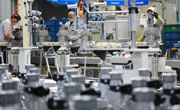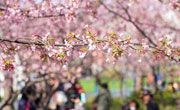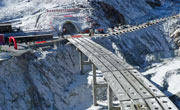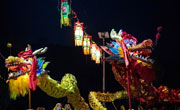Moscow(Russian)
Moscow(Russian)
[Overview] Moscow is the capital of the Russian Federation. Standing in the middle of the East European Plain, across the Moskva River and its tributary the Yauza River, the city covers an area of 2,560 square kilometers and has a population of 12.3 million.
[Politics] Moscow is governed by the City Duma and the City Government. The City Duma (i.e., city council) consists of 35 members and its chairman is elected by secret ballot. The term of office of both the members and the chairman is four years. The City Government is the executive body of local administration. The city has 12 districts under its jurisdiction. The incumbent Mayor of Moscow, Sergey Sobyanin, took office for the first time in 2010 and was re-elected for the second term in 2013 and for another five-year term in September 2018.
[Economy] Moscow is Russia's largest industrial city as well as financial and commercial center. The city has a mature secondary sector, including well-developed heavy industry and chemical industry. Machinery and instrument manufacturing contribute to more than 50% of the gross output of the city's entire secondary sector. The city is also the largest military industry center in Russia, with developed aviation, aerospace, and electronics industries. There are more than 1,000 commercial banks in the city, making up 50% of the national total. The city also has 85% of the country's financial assets and 90% of the country's investment and business activities. Moscow is ranked first in Russia by foreign investment and GDP. The city has a sound public transportation system and is the transportation hub of Russia.
[Culture and Education] Moscow is Russia's education, science and technology center, as well as a historically and culturally renowned city. It is ranked among the world's top cities by the proportion of citizens with a bachelor's degree or above. There are many institutions of higher education in the city. The Russian Academy of Sciences and more than 90 of its research institutes are located in Moscow. Famous universities in the city include Moscow State University and the People's Friendship University of Russia. The Russian State Library, formerly Lenin Library, is one of the largest libraries in the world. There are many cultural and sports facilities in the city, including over 350 theaters, concert halls, museums, and exhibition halls. The world-famous Bolshoi Theatre and its Bolshoi Ballet are also based in Moscow.
[Relations with Beijing] On May 16, 1995, Beijing and Moscow officially became sister cities. Since then, the two cities have maintained close ties and engaged in frequent exchanges and cooperation in investment, trade, science, technology, education, urban planning and development, city administration, judicial affairs, and culture. In 2012, Moscow joined the World Tourism Cities Federation (WTCF) which was established on the initiative of Beijing.
Investment and Trade: Moscow held the Moscow Week in Beijing in 2006. Beijing held the Beijing Week in Moscow in 2007. The two cities organized large-scale business networking activities on the sidelines of these events. In March 2007, Beijing sent a delegation to Moscow to participate in the Chinese National Exhibition and hold a trade promotion conference. In 2012, Moscow held an investment promotion meeting in Beijing, attracting hundreds of companies in Beijing. The meeting played an important role in encouraging Beijing-based companies to invest in Moscow.
Science and Technology: Since 2009, Beijing and Moscow have held four China-Russia Urban Security Technology Seminars to exchange technologies and experience in urban security system deployment, urban traffic safety, and cybercrime investigation and evidence collection. In 2017, Beijing attended a meeting on sustainable urban development and energy efficiency held in Moscow to encourage cooperation between the two cities in the field of energy technology.
Legislation: In 2000, the Beijing Municipal People's Congress and the Moscow City Duma signed a friendly exchange agreement. In 2011 and 2015, the Standing Committee of the Beijing Municipal People's Congress sent a delegation of deputies to people's congresses at local levels to Moscow to engage in exchanges with members of the Moscow City Duma, deepening cooperation between the two sides.
Culture: In recent years, cultural exchanges between the two cities have become more frequent, and they have co-organized many cultural festivals or other cultural activities. From 2012 to 2013, within the framework of the China-Russia Year of Tourism Program, Beijing and Moscow sent 50 families to each other's city to take homestay vacations. In March 2012, at the opening ceremony of the Year of Russian Tourism held in Beijing, 50 Russian families were invited to take a homestay vacation in Beijing from September 29 through October 4, 2012. The homestay exchange became a highlight of the Year of Russian Tourism in China. President Xi Jinping spoke highly of the homestay exchange when addressing the opening ceremony of the Year of Chinese Tourism in Russia held in March 2013. He said, “These Chinese and Russian families live together like relatives and have developed deep friendships. They are reluctant to part with each other. I believe that they will cherish this beautiful experience forever.” During Moscow Week 2017 held in Beijing, the two cities jointly organized more than ten events including special forums, promotion conferences, performances, cultural activities, and sports competitions. In 2018, the Beijing Day event was staged in Moscow. A host of activities, including forums on urban rail transit, investment and trade, youth sports competitions, and urban development, tourism promotion conferences, “Charming Beijing” exhibition, trade show on Beijing's time-honored brands, traditional Chinese painting and calligraphy exhibition, “Beijing Night” concert, were organized in response to the important consensus reached by the Chinese and Russian heads of state on co-organizing the 2018-2019 China-Russia Year of Local Cooperation and Exchange.
莫斯科市(俄罗斯)
【概况】莫斯科市是俄罗斯联邦首都,位于东欧平原中部、跨莫斯科河及其支流亚乌扎河两岸,面积2560平方公里,人口1230万。
【政治】莫斯科市城市管理机构分为市杜马和市政府。市杜马即市议会,共35个席位,主席通过议员无记名投票选举产生。议员和主席任期均为4年。市政府为行政管理执行机关。全市下辖12个区。现任市长谢尔盖·索比亚宁于2010年首次就任,2013年再次当选,并于2018年9月连任,任期5年。
【经济】莫斯科是俄最大综合性工业城市,俄金融、商业中心。全市工业部门齐全,重工业与化学工业发达,机械和仪表制造业占全市工业总产值的50%以上。该市也是俄最大的军事工业中心,航空、航天、电子工业发达。全市有1000多家商业银行,占全俄的50%。金融资产占全国的85%,投资和商业活动占全国的90%。外国投资和经济总量居全俄之首。市内公共交通设施完善,是全俄交通枢纽。
【文化教育】莫斯科是俄教育、科技中心和历史文化名城。市民中大学以上文化水平比例在世界大城市中名列前茅。市内有众多高等教育机构和大学。俄罗斯科学院及其90余个科研机构设在莫斯科。著名大学有莫斯科大学、俄罗斯人民友谊大学等。俄罗斯国立图书馆(原列宁图书馆)是世界最大图书馆之一。全市文化体育设施齐全,各类影剧院、音乐厅、博物馆、展览馆等350多座。莫斯科大剧院及其上演的芭蕾舞闻名于世。
【两市交往】1995年 5月16日,北京市与莫斯科市正式建立友好城市关系。结好以来,两市交往密切,友好合作关系不断加强,在经贸、科技、教育、城市规划建设与管理、司法、文化等领域交往频繁。2012年,莫斯科市加入由我市倡议成立的世界旅游城市联合会。
经贸交往:2006年、2007年,莫斯科市与北京市分别在对方城市举办“莫斯科周”和“北京周”,举办大型经贸洽谈会。2007年3月,北京市代表团赴莫斯科参加中国“国家展”,并举办经贸推介会。2012年,莫斯科市在京举行投资推介会,北京市上百家企业参加推介会,促进北京企业参与莫斯科招商引资项目。
科技合作:自2009年起,北京市与莫斯科市连续举办了四次“中俄城市安全技术交流会”,交流城市安全体系规划、城市交通安全、网络犯罪调查取证等领域的技术和经验。2017年,北京市参加在莫斯科市举办的“城市可持续发展和能源效率”会议,增进了双方在能源科技领域的交流与合作。
立法工作:2000年,北京市人大与莫斯科市杜马签署友好交流协议。2011年、2015年,市人大常委会组织基层人大代表访问莫斯科,与莫斯科市杜马议员开展交流,深化双方友好合作。
人文交流:近年来,两市文化交流日益频繁,多次在对方城市互办“文化节”或举行文艺演出,受到两市市民热烈欢迎。2012-2013年,在中俄互办“旅游年”框架下,北京市与莫斯科市互派50个市民家庭到对方城市体验民宿旅游。2012年3月,在北京举办的“俄罗斯旅游年”开幕式上,北京市邀请50个俄罗斯家庭来京体验民宿交流,并于当年9月29日至10月4日成行。此次民宿交流活动的成功举办,成为中国“俄罗斯旅游年”中的一个亮点。在2013年3月俄罗斯“中国旅游年”开幕式上,习近平主席在致辞中对该活动给予高度肯定。他说,“这些中俄家庭就像亲人一样一起生活,结下了深厚友谊,分别时都依依不舍。我相信,他们都会把这一段美好的经历永远珍藏在心中。”2017年,莫斯科市在京举办“莫斯科周”活动,双方共同组织了专题论坛、推介会、演出、文化节、体育比赛等十余场活动。2018年,北京市在莫斯科市举办了“北京日”系列活动。“北京日”系列活动是我市落实中俄两国元首关于共同举办2018-2019年“中俄地方合作交流年”重要共识的有力举措。活动主要包括都市轨道交通论坛、经贸论坛、青少年体育比赛、城市建设论坛、旅游推介会、魅力北京展、北京“老字号”展卖、中国传统书画展、“北京之夜”音乐会等交流活动。
(Source: Foreign Affairs Office of Beijing Municipal Government)
[ Editor: WPY ]










More From Guangming Online
Medics from Fujian leave for Shanghai to aid in battle against COVID-19 resurgence
New int'l land-sea transport service to Indo-China Peninsula launched
Another makeshift hospital under construction in Shanghai
Tourists view tulips in Suiping County, Henan
In pics: blooming gagea flowers on grassland in Zhaosu, Xinjiang
Greek workers stage 24-hour general strike over high prices